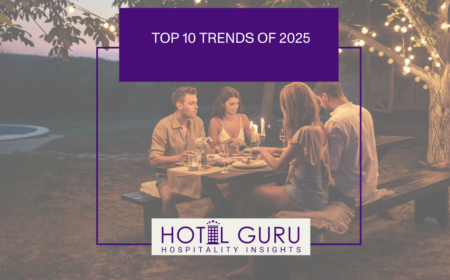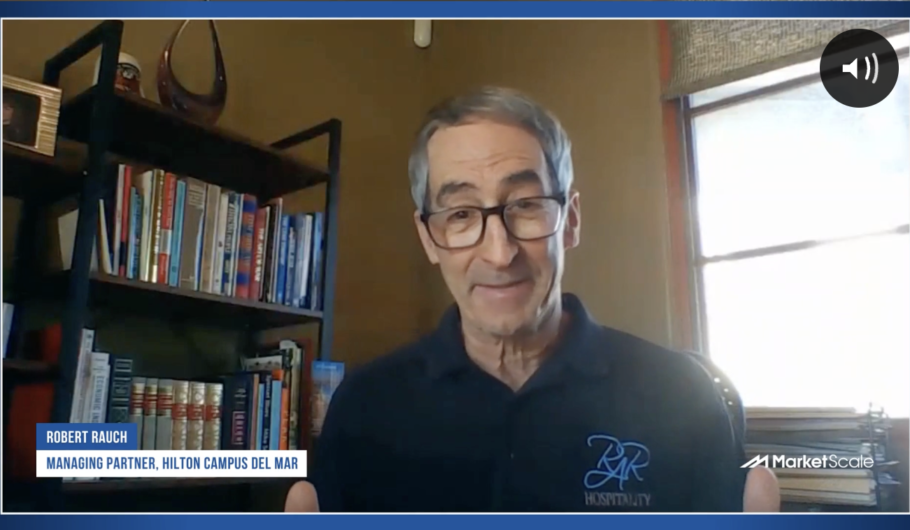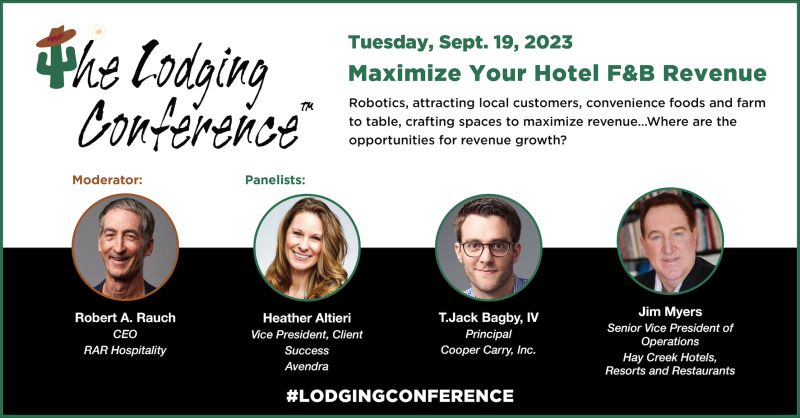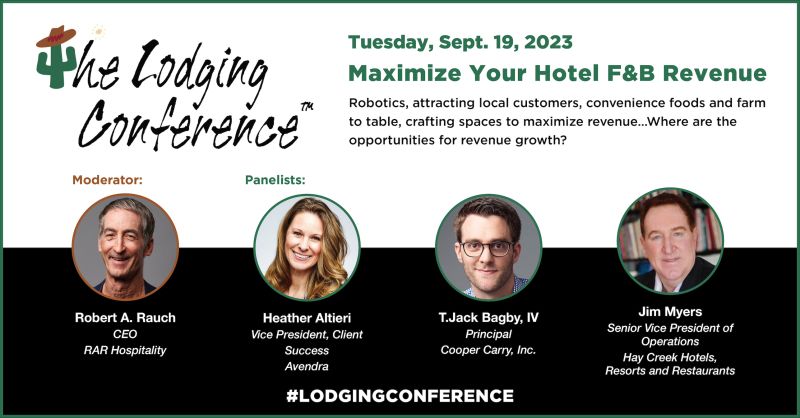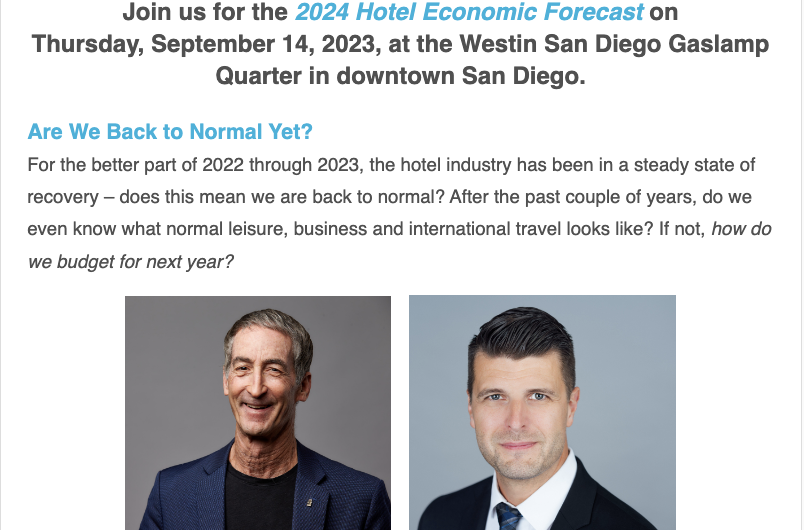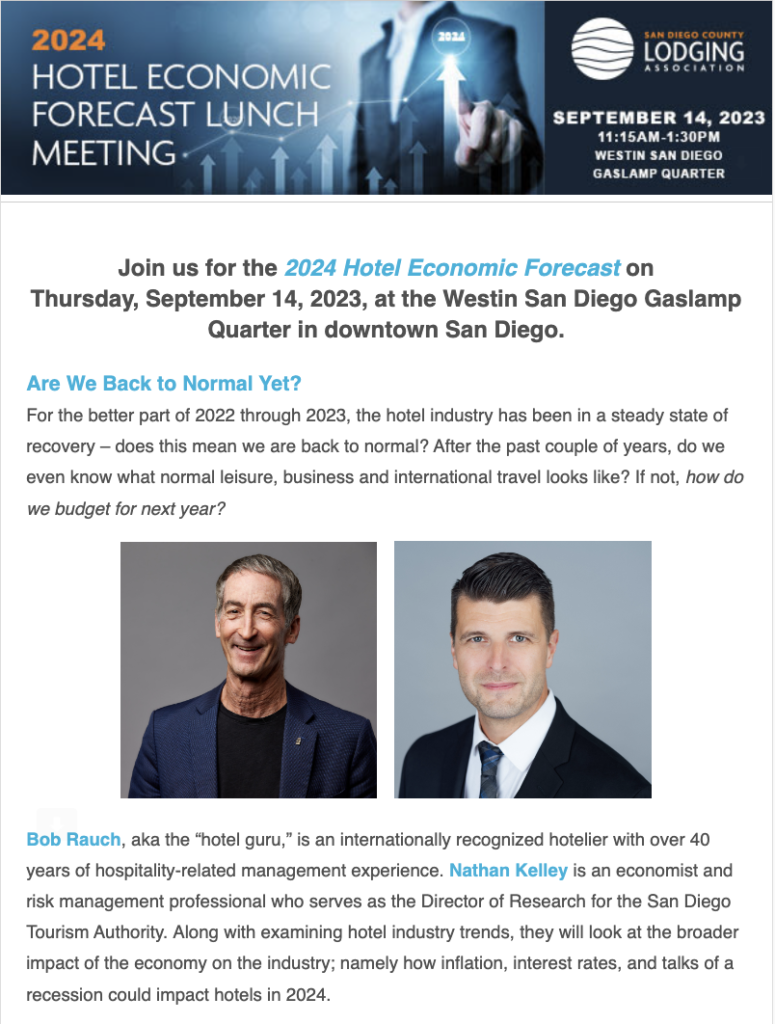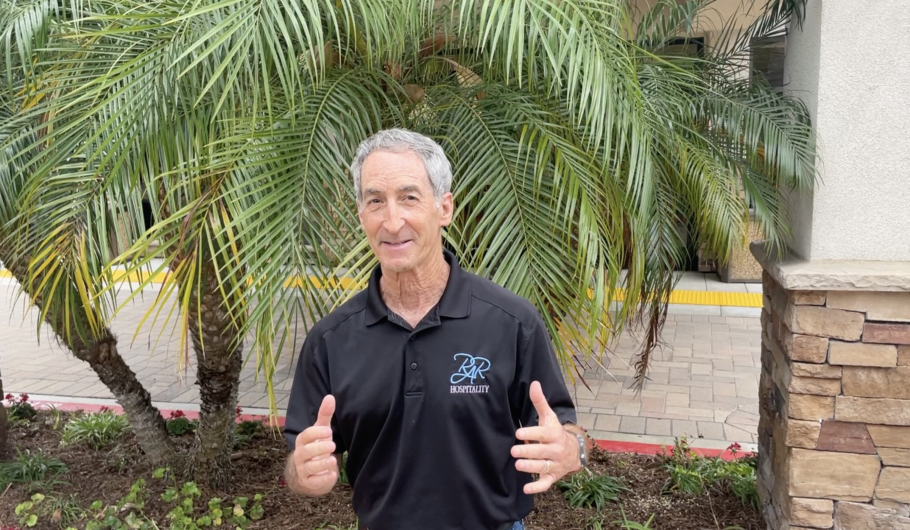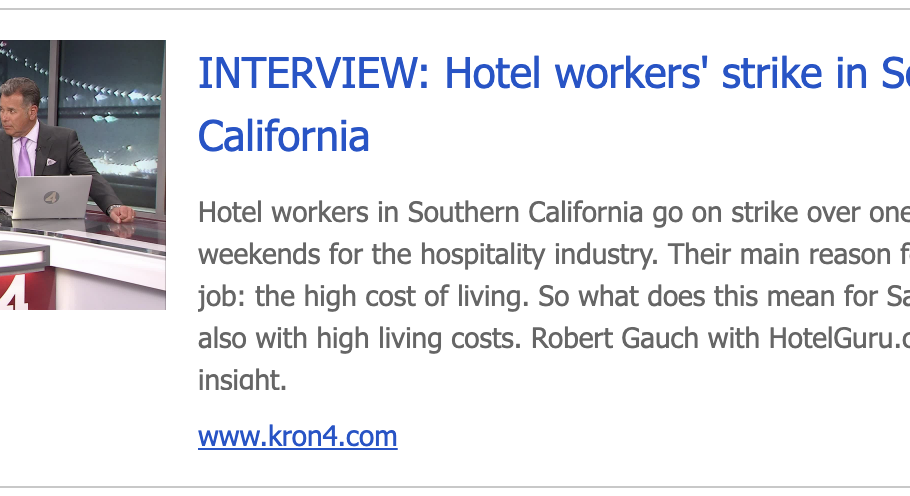Six Traits for Success as a Hospitality Entrepreneur
Planning, Creativity, Collaboration Among Them
By Robert Rauch
December 5, 2023 | 5:59 AM | This article first appeared on HNN.
Many young potential hoteliers have asked me what it takes to be an entrepreneur in this great and noble industry.
Some are my students — I teach Entrepreneurship at Arizona State University — and others I meet at industry gatherings or are rising employees at our hotels.
Here are the six traits for success that I often discuss with them.
Lifelong Learning
I can’t recall the last time I felt I had learned enough and didn’t need further education. Although I don’t attend every conference session presently, I read new content daily, attend conferences, stay involved in all local hospitality associations where we operate, and use my teaching, writing and speaking engagements to continue growing.
I firmly believe that staying actively engaged like this leads to a bright hospitality future. If one aspires to be their own boss, these are key principles of success. Additionally, asking questions and being prepared to take risks is essential.
Business Planning
Whether you’re already in business for yourself or considering it, having a simple business plan outlining short-term and long-term goals is crucial. A well-thought-out plan for each day and a roadmap for growth increase the likelihood of success. Business plans need not be highly academic; a set of action plans suffice.
For those seeking capital, more sophisticated approaches outlining all business risks and strategies to capture market share are necessary. A detailed budget is critical when seeking capital.
Tech Comfort
You don’t need to be the on-call IT person at your company. However, if you’re unwilling to learn about websites and their content, engage in social media or use technology without help, your future prospects will be severely limited.
Becoming tech-savvy enables you to compete, even if you’re not a Gen Zer or millennial! Embracing technology allows you to keep pace with artificial intelligence, robotics and the Internet of Things.
High Activity
Differentiation of your product is crucial to gaining market share in both the hotel and vendor sides of hospitality.
Michael Porter, whom I consider the Dean of Competitive Advantage, always stressed the importance of a long-lasting competitive advantage. Price is good for a day, but a true advantage endures because it can’t be quickly replicated. Be proactive and view adversity as a challenge to progress.
Creativity and Collaboration
Visualization is as effective in business as it is in sports. Whether preparing a speech, game-planning for a sports event or launching a business, creativity can make all the difference.
Visualizing the future can stimulate, energize and provide enthusiasm for your project, whatever it might be. A creative imagination might even surpass the knowledge others have gained.
As Einstein once said, “Imagination is more important than knowledge.” Collaborate with others — seek counsel and build a trustworthy team.
Financial Acumen
You don’t need to be a CPA to succeed, but every entrepreneur requires a keen awareness of finance. Cash is king, details matter, and every penny must be accounted for — otherwise, a great marketing plan and operational execution can be wasted. Clean month-end closes, prompt review of profit-and-loss statements and careful examination of every financial document are immensely helpful.
A successful entrepreneur drives towards their goal while disregarding doubters. Make the plan, execute it and have a fantastic holiday season and a successful 2024!
Robert A. Rauch is founder of R.A. Rauch & Associates, a hospitality management and consulting firm based in San Diego.
What To Expect and What Can Go Wrong for Hoteliers in 2024
Challenges Abound, But American Mindset Remains ‘Travel Is a Birthright’
By Robert Rauch
HNN columnist – Original article can be found HERE
U.S. hotel occupancy has been flat for the past 90 days, but average daily rate has already surpassed 2019 levels.
New hotel supply is muted due to high-interest rates and high construction costs, which has provided some tailwinds. We expect revenue per available room to be up 5% in 2024, driven by stable leisure travel, stronger business, group and international travel, and the continuation of the American mindset that “travel is a birthright.”
Capitalization rates will likely increase somewhat in 2024 as there will be many loans and property improvement plans coming due, increasing some pressure on owners with those loans that are at 4% to 5% now. Interest rates are at 7% to 8%.
Wage increases are 20% above 2019, and average rates, albeit up from 2019 by double digits, cannot keep pace. Additionally, insurance and energy costs are up markedly. Consumers have dollars to spend, but in some markets, it’s likely that short-term rentals will continue stealing some market share from hotels. Also expect U.S. citizens to fly off to Europe through most of 2024.
Questions include: How high will oil prices get? Will there be layoffs and unemployment?
Delinquency on loans has picked up and trillions of dollars of debt will mature by 2025. That said, there is private equity ready to jump in. Household debt is high and not sustainable, but the job market should keep it up through what will likely be a soft landing, not a recession.
We expect a modest pullback in spending through the second quarter of 2024 and then a strong rebound in the third and fourth quarters. Inflation should calm down to 2.6% in 2024, according to Bernard Baumohl of the Economic Outlook Group.
What Can Go Wrong?
What might go wrong with hotel revenue growth? To summarize from Baumohl’s Lodging Conference presentation, the Federal Reserve moves rates up, the economy stumbles, a banking crisis arises, and financial stress is put on our entire industry. The 2024 U.S. presidential campaign could create social unrest and/or violence and new COVID-19 strains might spread quickly and dodge immune systems. Additionally, there are foreign risks, the Russia-Ukraine war could expand, China may push harder to annex Taiwan, and a catastrophic cyber warfare event is possible according to 93% of cybersecurity experts.
The bottom line is that the hotel industry still faces headwinds. Accommodation employment remains 250,000 positions below the pre-pandemic level as of June. Attracting new workers can be costly, and the reduced headcounts have led to strong wage growth for leisure and hospitality workers, which has ultimately affected the bottom line. Operating expenses have also increased due to inflation in other areas, including food, energy and insurance costs.
The hospitality industry is undergoing tremendous innovation driven by artificial intelligence. Hotels are expanding their offerings, particularly in the luxury space as the lines between work, life and play have blurred and the world’s population continues to grow. These include private-membership clubs, yachts and branded residences. Hotels have also embraced technology to streamline workflow and enhance the guest experience, leveraging digital platforms and a range of innovative solutions including virtual tours, self-service kiosks, predictive analytics and AI-powered chatbots.
Renovation and construction costs are up significantly. Lead times on furniture, fixtures and equipment are within 10% of pre-pandemic levels, so the supply chain has become less congested, with items that might have taken 12 weeks pre-pandemic now taking 14 weeks, a major improvement from a year ago. But pricing has stabilized at around 15% higher than pre-pandemic levels, so renovation costs are still significantly higher compared to 2019. The cost of labor and construction materials also have skyrocketed.
CoStar’s Jan Freitag stated: “In terms of normalization … the way I think about it is that the outperforming markets are normalizing back to growth rates that are normal because they were overindexed — and underperforming markets are also coming back to normal because their growth rates are not going to be that bad forever.” Every market will experience different dynamics.
To a great fourth quarter that leads to an even better 2024!
Robert A. Rauch is founder of R.A. Rauch & Associates, a hospitality management and consulting firm based in San Diego.
Why Hotels Should Learn to Love Robot Technology
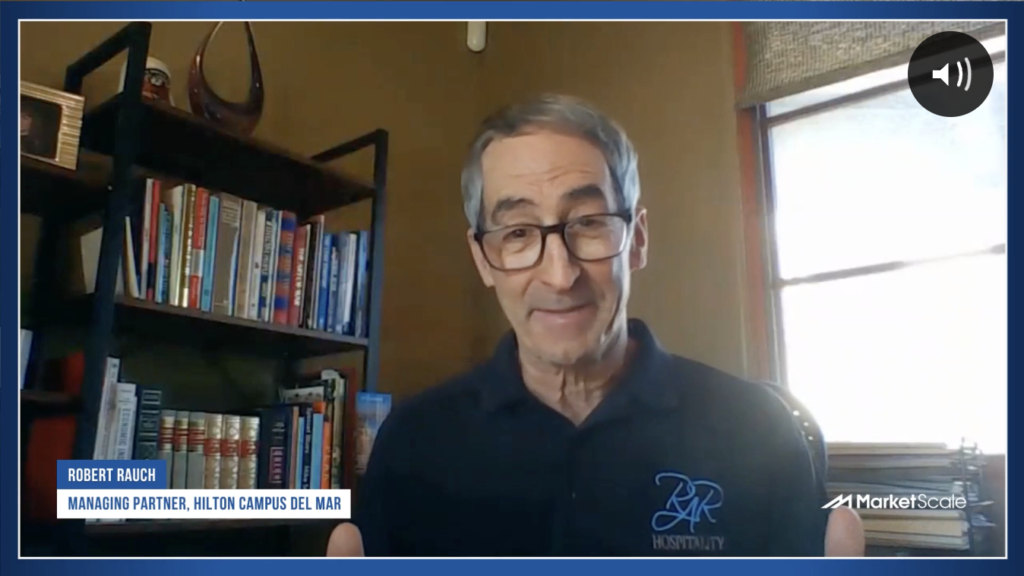
The guest experience is getting upgraded at many hotels today thanks to innovative robot technology.
Aloft Hotels first introduced the world’s first robotic concierge in the early 2000s, and in 2014, they brought Botlr, a robot butler service, to the team. These AI enhancements increased the guest experience through shorter wait times for room deliveries and improved housekeeping operations efficiency. Aloft may have led the way, but other hotel chains are quickly catching on to the advantages of robotic services.
Some challenges could offset these advantages due to the costs of implementing and maintaining the robotic infrastructure and a lack of industry-wide standards for hotel robots. Yet, as hotels face a growing demand for services amidst a shortage of workers, they are likely to increasingly turn to robotics for solutions. Experts predict the global market for hotel robots will grow to $338 million by 2025.
Robert Rauch, hotel entrepreneur, Managing Partner, Hilton Campus Del Mar, faculty associate at the School of Community Resources & Development at Arizona State University, and CEO of RAR Hospitality, see the efficiency benefits of bringing robotics to both front- and back-of-house hotel operations as multi-layered. Beyond that, though, Rauch sees the investment as a smart move for increasing hotel profit margins in 2024.
Robert’s Thoughts on Robot technology in Hotels
“I’ve got to tell you, robotics is the future. We have two types of robots. One is a service robot, the other is a vacuuming robot. So the service robot we’ve had for six years now, and I can tell you the guests see the service robot at the front desk. By the time they’re up in their room asking for either food, beverage, or supplies, they ask for the robot.
Now, is it because they don’t have to leave a tip? No. Really, they are just wowed by interacting with the robot. So what else does the robot do? If you have an 11:00 PM to 7:00 AM shift where you have one employee in the hotel, because it’s a limited service hotel, you’ve got better security because the delivery’s made by the robot. Also, you’ll be able to tell if the WiFi system is not working because it works on the WiFi system, so it’ll tell you if there’s a problem, and it also has a camera and sees any security issue in the hotel. So, highly recommend getting a service robot.
Relative to vacuuming robots, while we’ve only had them for about six or seven months now, I can tell you that it reduces pressure on the housekeeper’s backs and also creates a productive environment where the housekeeper’s cleaning the bathroom while the robot is vacuuming the floor in the bedroom. So, why get involved? Great PR, your guests will love it, your employees will love it, and it’ll help your productivity.”
A Chapter Book to Hotel Planning
Step-by-Step Guide to Hotel Business Plans
By Robert Rauch
HNN columnist – Original article can be found HERE
September 26, 2023 | 5:35 AM
Today, there are two critical elements that must be planned and executed by every hotelier; the business plan and the budget. A short summary up front will save the Type A reader from heartache, and six short chapters with a concluding chapter on what steps are needed is very helpful.
The first chapter is a current status or forecast of trends as well as a competitive analysis that shows how we stack up against the hotels in our STR competitive set. I attended the Lodging Conference to listen to Bernie Baumohl of the Economic Outlook Group, a great presenter and forecaster of macroeconomics. I also like to have a graphic that lists how we compete in various areas like location, brand, reputation, amenity package and so forth. I call it our beauty contest.
The second chapter includes fiscal risks as well as operational risks. If we are unable to pay for a needed renovation or if we are having difficulty finding employees, that information is critical for the owner. Anything that puts the hotel at a competitive disadvantage should be discussed here, not just competitive advantages.
Chapter three is a review of the geographic location including transportation and neighborhood demographics that include our intended target market. Using data from the local tourism authority or chamber of commerce assists us as will an analysis of our market segmentation. Today, we have seen shifts in business and group travel as well as domestic leisure and international travel.
Chapter four identifies the key management personnel. An overall organizational chart that includes all salaried executives and key leadership is appropriate. Adding the key responsibility parameters for each of them is very helpful for the reader and ensures that all are on the same page. Further, we are all finding lots of need for training new management team members who were line employees last year.
As we increasingly provide guests with an authentic connection to our area, a well-configured hotel revenue/sales system can help us optimize these strategies and boost revenue. A lead form at the front desk, and reviewing competitor websites/social sites — including Instagram, Facebook and Twitter — is critical. Looking at all previous users of our property, strengthening community relationships and exploring creative partnership opportunities work wonders.
Chapter five is a market analysis that identifies all direct and indirect competitors along with a summary of each and a brief summary of how we will compete and position our hotel with each. Develop a demand projection based on an estimate provided by a local guru from a tourism authority or consulting firm, or if you prefer, go with your gut after completing the work below.
Review market intelligence reports carefully. Ensure email lists are updated for newsletters and e-blasts and meet with general managers and marketing team members of competitor hotels. Site tour each business and establish a referral program. Coordinate a market review with the revenue management team and discuss opportunities for digital marketing and pay-per-click.
Additionally, meeting with key contacts at the brand, visitor bureau and chambers of commerce is worth the time. Qualify key companies and individuals to create or update email lists. Business Journals also have great lists of top businesses and employers. Continuously create and deliver “can’t-resist” content for websites and e-blasts. Post to social media at least two times per week, and use public relations effectively by having a PR plan and a clear sales action plan with whom, what, when and how much does it cost?
Chapter six morphs into the budget, which should be commenced only after we know what the draft business plan looks like. This financial analysis must include all needed capital expenses as well as operating expenses for each department. Remember that inflation has moved energy, insurance, food and labor costs up significantly over the past 18 months. Supply costs are up, and if revenues will not be sufficient to pay these expenses, here is where big decisions must be made. Budget accuracy depends on the determination made to gather correct and current market data, so research is paramount!
Chapter seven is our summary of how we will perform and why. It behooves all of us to do this work prior to the budget, though many hotel executives will continue to use a plugged budget number from last year’s profit and loss statements. Be honest about the hotel’s strengths and weaknesses and we will nail our budgets!
2024 will see increased use of big data, robotics and artificial intelligence. Stay up on the latest and we will all love 2024, an election year!
Robert A. Rauch is founder of R.A. Rauch & Associates, a hospitality management and consulting firm based in San Diego.
The ‘Secret Sauce’ for Hotel Food and Beverage
Tips for Hiring, Training and Serving Up Memorable Experiences
By Robert Rauch
See original article posted on CoStar HERE
The hospitality industry runs on creating memorable guest experiences.
If not, it becomes a business with no differentiation, merely selling commodities. It is paramount that hoteliers go above and beyond for our guests, and the best way to do it is to truly differentiate from our competitive set by doing something bespoke.
Food and beverage scare most hoteliers in the focused-service sector, so go for it! Exceed guest expectations with a combination of creativity with food and beverage and smart hiring. The creative food and beverage might include education, wellness, nutrition or just plain cool drinks and good food. Smart hiring makes all the difference!
Hiring Based on Attitude
Skills are not that important. Rather, a positive attitude, a sales mindset, tech-savviness and financial accountability often outweigh specific skill sets. Ultimately, it is the “attitude” that makes all the difference.
We recognize the value of team members who are passionate about delivering exceptional service. In addition, we want these team members to align with our organizational culture and values. By prioritizing attitude in our hiring process, we can cultivate a motivated and engaged team that consistently delivers for our guests.
Today, it is much more difficult to find the right person. We have found that we were perhaps too focused on experience and not focused enough on the person.
Valuing Guest Reviews
As an owner, I personally read every review of our hotels and particularly the reviews of our restaurants. Reviews provide valuable insights into guest perspectives, highlighting areas for improvement. These reviews are an essential source of feedback that we must not overlook.
By actively listening to our guests and taking their feedback to heart, we can continuously refine our offerings and enhance the guest experience. Responding to reviews, both positive and negative, demonstrates our commitment to guest satisfaction and encourages open communication.
Learning Through Training
By investing in employee training, we ensure that they appreciate the importance of delivering excellent service. Continuous skill and knowledge development empower our team to provide exceptional guest experiences. Focusing on key areas and excelling in them can have a significant impact on our guests.
Treating every individual as a VIP is a winning strategy as it fosters a great service culture and assists in our employees’ growth. We equip them with the tools and knowledge to create memorable moments for our guests and fully support them.
Food and Beverage
The “typical hotel restaurant” is more in line with today’s guest expectations. However, some hotels offer unique and much more enticing food and beverage experiences.
What are guests looking for? Well, health may not be the first thing on their minds, but when every choice is grease-laden, fat-laden and unhealthy, it is not acceptable to many guests. Some guests have high cholesterol and really do watch what they eat. Others are just plain health-conscious and want healthy meal options in conjunction with those healthy lifestyles.
Hotels that recognize a paradigm shift in customer preferences will outperform those that do not. Plant-based and vegan options have gained popularity over the past few years. Further, a sustainable environment and locally sourced ingredients continue to be a priority for some travelers.
Others have embraced mocktails as they either do not drink alcohol or have opted for a period of abstaining. Craft beverages are trending in the hospitality industry — from specialty cocktails to local beers and wines, our hotels are now adding education to the lineup. As an example, we recently hosted both a beer tasting and a wine tasting. The beer was from a local brewery and featured ales, lagers, stouts and more. The wine tasting was hosted by yours truly, fresh out of sommelier training. It was a blast and the guests loved learning about multiple varietals and drinking really good wine — no charge for loyalty members was really popular. The cost was my time as the wines were gifted by our suppliers.
Cheers to a great fourth quarter with no recession, no major tragedies, and lots of happy employees and guests!
Robert A. Rauch is founder of R.A. Rauch & Associates, a hospitality management and consulting firm based in San Diego.
The Power of Empathy and Personalized Service
Empowering Staff To Build Rapport With Guests Will Elevate Hospitality
By Robert Rauch
HNN columnist – Original article can be found here
July 12, 2023 | 5:25 AM
As the great civil rights activist Maya Angelou once said: “People will forget what you do; they’ll forget what you said, but they’ll never forget how you made them feel.”
This sentiment holds true in the hospitality industry, where we have the privilege of joining people as they celebrate the most joyous moments in their lives. However, it is equally important to offer moments of consolation and support during their most challenging times.
Hospitality is a noble profession, and our work truly matters. After the unprecedented lockdowns of 2020 and 2021, it is time to regroup and establish a new normal. While the pandemic imposed a temporary disruption to how we work, we must now reassess and redefine what the future of hospitality should be.
In this pursuit, we find ourselves reassessing the treatment of employees.
In the pre-lockdown era, we may have been strict with employees who were late, but now it is time to extend charitable assumptions, such as asking, “You’re late, is everything okay?” There are two reasons behind this approach. Firstly, the power dynamics have shifted, and employees now hold an advantage in the supply/demand spectrum. Secondly, it is simply the right way to treat our most valuable assets — our employees.
Applying the concept of charitable assumptions also extends to guests who exhibit poor behavior. During the lockdowns, many of us witnessed a decline in guest behavior, which we could attribute to various factors such as personal issues or the accumulated stress from disrupted lives. As travel resumes and guest behavior appears to return to normal, it is essential to give them the benefit of the doubt when isolated incidents occur.
One aspect of our approach is to engage with our guests relentlessly during breakfast, every single morning, seven days a week. Our general managers and top management team personally interact with guests, fostering a warm and welcoming atmosphere. We take the time to connect with families and ask children dining with their parents, “Where are your folks taking you today?”
These interactions not only help build a fantastic rapport but also provide insights into our guests’ experiences. Meeting the general manager of a hotel is an uncommon occurrence for guests, and this personalized engagement significantly improves our guest satisfaction scores. Ultimately, at a hotel, nothing surpasses the importance of personalized service.
In addition to personalized interactions, incorporating innovative technology solutions can further enhance the guest experience. From mobile check-ins to customized room preferences, technology can streamline processes and provide tailored experiences for each guest. By leveraging data and guest preferences, we can anticipate their needs and deliver personalized services that go above and beyond their expectations.
Furthermore, investing in employee training and development is crucial for delivering exceptional personalized service. By providing ongoing training programs, we empower our employees with the necessary skills and knowledge to deliver outstanding experiences. This includes not only technical training but also emphasizing the importance of empathy, active listening and problem-solving. When employees feel valued and equipped to provide personalized service, they are more likely to go the extra mile for our guests.
In summary, the power of personalized service extends to both our guests and employees. By adopting charitable assumptions, engaging with guests on a personal level, leveraging innovative technology, and investing in employee training, we can create a hospitality experience that leaves a lasting impact.
By delivering exceptional personalized service, we can create lasting memories and elevate the hospitality experience for all. Let us embrace the importance of personalized service as we forge ahead into the future, setting new standards and exceeding expectations in the ever-evolving landscape of the hospitality industry. Let us relish the summer of a recovered tourism industry and conclude the year with a sense of hope.
Robert A. Rauch is founder of R.A. Rauch & Associates, a hospitality management and consulting firm based in San Diego.

